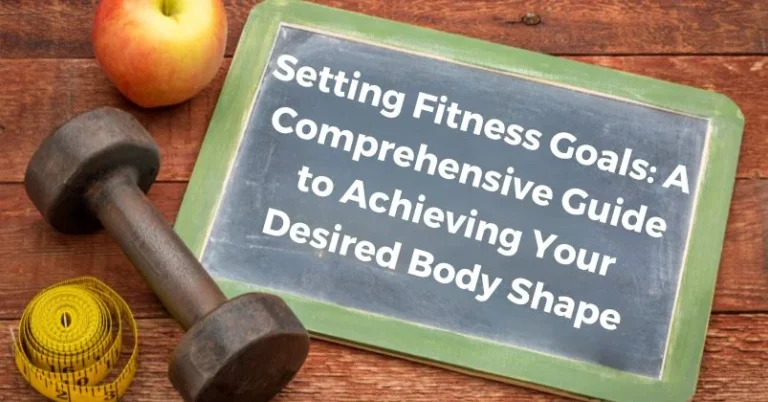The Ultimate Guide to Exercise Motivation: Achieve Lasting Fitness Success with Expert Tips and Strategies
Are you struggling to stay motivated with your exercise routine? Do you find yourself making excuses to skip workouts or struggling to stick to a healthy diet? If so, you're not alone. Many people struggle with exercise motivation, but the good news is that there are strategies you can use to unleash your potential and achieve lasting fitness success.
In this ultimate guide to exercise motivation, you'll learn about the power of physical activity, the role of nutrition and hydration, and the importance of setting and achieving fitness goals. You'll discover how to build a supportive fitness community, incorporate healthy habits into your lifestyle, and develop mental toughness and resilience. You'll also learn about the benefits of strength training, weight loss, and overall health, as well as the importance of recovery and balance.
By following the strategies outlined in this guide, you'll be able to boost your confidence, overcome obstacles, and achieve your fitness goals. Whether you're a beginner or an experienced athlete, this guide has something for everyone. So what are you waiting for? Let's get started!
Key Takeaways
- Understanding the power of physical activity and the role of nutrition and hydration are essential for exercise motivation.
- Setting and achieving fitness goals, building a supportive fitness community, and incorporating healthy habits into your lifestyle can help you unleash your potential.
- Developing mental toughness and resilience, strength training, and prioritizing recovery and balance are key to achieving lasting fitness success.
Understanding Exercise Motivation
Motivation is the driving force that propels you towards achieving your fitness goals. Without motivation, it's easy to slip into a sedentary lifestyle and neglect your health. Understanding what motivates you to exercise is key to unlocking your potential and achieving lasting fitness success.
Your mindset plays a crucial role in exercise motivation. A growth mindset, which focuses on personal growth and development, can help you stay motivated even when faced with challenges. On the other hand, a fixed mindset, which focuses on innate abilities and talent, can lead to a lack of motivation when faced with obstacles.
Discipline is another important factor in exercise motivation. Developing discipline means committing to a regular exercise routine, even when you don't feel like it. By making exercise a habit, you can overcome the initial resistance and make it a natural part of your daily routine.
To unleash your exercise potential, it's important to set realistic goals that align with your values. Whether it's losing weight, building muscle, or improving your overall health, setting achievable goals can help you stay motivated and track your progress.
In addition to setting goals, finding an exercise routine that you enjoy can also boost your motivation. Whether it's running, weightlifting, or yoga, finding an activity that you look forward to can make exercise feel less like a chore and more like a fun and rewarding experience.
In summary, exercise motivation is a combination of mindset, discipline, goal-setting, and finding an enjoyable exercise routine. By understanding what motivates you to exercise, you can unleash your potential and achieve lasting fitness success.
The Power Of Physical Activity
Regular physical activity is essential for overall health and well-being. Exercise can help you maintain a healthy weight, reduce the risk of chronic diseases, and improve your mental health. In this section, we'll explore the impact of physical activity on your health, energy, endurance, flexibility, and agility.
The Impact On Health
Physical activity has numerous health benefits. It can help reduce the risk of chronic diseases such as heart disease, stroke, and diabetes. Exercise can also help lower blood pressure, improve cholesterol levels, and boost the immune system. Regular physical activity can also improve mental health by reducing symptoms of anxiety and depression.
Boosting Energy And Endurance
Physical activity can help boost your energy levels and improve endurance. Exercise increases blood flow and oxygen delivery to your muscles, which can help reduce fatigue and improve endurance. Regular physical activity can also help improve sleep quality, which can help boost energy levels throughout the day.
Enhancing Flexibility And Agility
Physical activity can help enhance flexibility and agility. Stretching exercises can help improve flexibility, which can help reduce the risk of injury and improve the range of motion. Agility exercises can help improve balance and coordination, which can help reduce the risk of falls and improve overall mobility.
In conclusion, physical activity is a powerful tool for improving your health and well-being. Regular exercise can help reduce the risk of chronic diseases, boost energy and endurance, and enhance flexibility and agility. Incorporating physical activity into your daily routine can help you unleash your potential and achieve lasting fitness success.
Nutrition And Hydration
Importance Of Balanced Nutrition
Maintaining a balanced diet is crucial to achieving your fitness goals. Eating a variety of nutrient-dense foods provides your body with the energy and nutrients it needs to perform at its best during exercise. Some key nutrients to focus on include:
- Protein: essential for muscle growth and repair
- Carbohydrates: provide energy for your workouts
- Healthy fats: important for hormone regulation and overall health
- Vitamins and minerals: play a role in many bodily functions, including energy production and muscle function
To ensure you are getting the right balance of nutrients, aim to include a variety of whole foods in your diet, including fruits, vegetables, lean proteins, and whole grains. Avoid highly processed foods, which are often high in added sugars and unhealthy fats.
Role Of Hydration In Exercise
Staying hydrated is also crucial for exercise performance and overall health. When you exercise, your body loses water through sweat, and it's important to replace those fluids to avoid dehydration. Some tips for staying hydrated during exercise include:
- Drink water before, during, and after your workout.
- Consider sports drinks if you are exercising for longer than 60 minutes or in hot weather, as they can help replace electrolytes lost through sweat.
- Pay attention to your body's thirst signals and drink when you feel thirsty.
In addition to drinking water, you can also get fluids from other sources, such as fruits and vegetables. For example, watermelon, cucumber, and celery are all high in water content and can help keep you hydrated.
By focusing on balanced nutrition and hydration, you can set yourself up for success in your fitness journey. Remember to listen to your body's signals and make adjustments as needed to ensure you are fueling and hydrating properly.
Setting And Achieving Fitness Goals
Setting and achieving fitness goals is a crucial part of any fitness journey. It helps you stay motivated, focused, and accountable. Here are some sub-sections to help you get started:
Identifying Your Fitness Levels
Before you set any fitness goals, it's essential to identify your current fitness levels. This will help you set realistic goals and track your progress effectively. You can assess your fitness levels by:
- Measuring your body composition, such as your body fat percentage, muscle mass, and BMI.
- Testing your cardiovascular endurance, such as running or walking for a certain distance or time.
- Testing your muscular endurance, such as doing as many push-ups or squats as you can in one minute.
- Testing your flexibility, such as doing a sit-and-reach test.
Creating Realistic Goals
Once you've identified your fitness levels, it's time to create realistic goals. Here are some tips to help you create effective fitness goals:
- Make your goals specific and measurable. Instead of saying, “I want to lose weight,” say, “I want to lose 10 pounds in three months.”
- Make your goals challenging but achievable. Don't set goals that are too easy or too difficult.
- Break down your goals into smaller, manageable steps. For example, if your goal is to run a 5K, start by running for five minutes a day and gradually increase your time.
- Write down your goals and track your progress. This will help you stay motivated and accountable.
Commitment And Accountability
Setting goals is one thing, but sticking to them is another. Here are some tips to help you stay committed and accountable:
- Find a workout buddy or hire a personal trainer. Having someone to work out with can help you stay motivated and on track.
- Join a fitness class or group. This can provide you with the support and accountability you need to achieve your goals.
- Use a fitness app or tracker to monitor your progress. This can help you stay on top of your workouts and track your progress.
- Celebrate your successes. When you achieve a goal, no matter how small, celebrate it! This will help you stay motivated and committed to your fitness journey.
Remember, setting and achieving fitness goals takes time and effort. Be patient, stay committed, and you'll be on your way to achieving lasting fitness success.
Building A Supportive Fitness Community
When it comes to exercise motivation, having a strong support system can make all the difference. Building a community of like-minded individuals who share your fitness goals can help you stay accountable, motivated, and on track to achieving lasting success.
Here are some tips for building a supportive fitness community:
Join A Fitness Class Or Group
One of the easiest ways to build a supportive fitness community is by joining a fitness class or group. Whether it's a yoga class, spin class, or boot camp, you'll be surrounded by individuals who share your passion for fitness and can help keep you motivated and on track. Plus, you'll have the added benefit of a knowledgeable instructor who can provide guidance and support.
Find A Workout Buddy
Having a workout buddy can be a great way to stay accountable and motivated. Find someone who shares your fitness goals and schedule regular workout sessions together. Not only will you have someone to push you to your limits, but you'll also have someone to celebrate your successes with.
Use Social Media
Social media can be a powerful tool for building a supportive fitness community. Follow fitness influencers, join fitness groups, and share your fitness journey on social media. You'll be able to connect with like-minded individuals from around the world and gain inspiration and motivation from their stories.
Seek Support From Friends And Family
Your friends and family can be a valuable source of support when it comes to achieving your fitness goals. Share your goals with them and ask for their support and encouragement. You may even find that they're interested in joining you on your fitness journey.
Celebrate Your Successes
Finally, it's important to celebrate your successes and share them with your fitness community. Whether it's hitting a new personal best or completing a challenging workout, take the time to acknowledge your accomplishments and share them with those around you. Not only will it help keep you motivated, but it will also inspire others to achieve their own fitness goals.
By building a supportive fitness community, you'll be able to stay motivated, accountable, and on track to achieving lasting success. So don't be afraid to reach out and connect with others who share your passion for fitness. Together, you can unleash your potential and achieve your fitness goals.
Incorporating Healthy Habits Into Your Lifestyle
Incorporating healthy habits into your lifestyle is essential to achieving lasting fitness success. By making small changes to your daily routine, you can create a healthier, more active lifestyle that will help you stay motivated and on track with your fitness goals.
One of the most important healthy habits to incorporate into your lifestyle is regular exercise. Whether you prefer high-intensity interval training, yoga, or a brisk walk, finding an exercise routine that you enjoy is key to staying motivated and committed to your fitness goals.
Another healthy habit to consider is meal planning and preparation. By planning and preparing your meals in advance, you can ensure that you are eating a healthy, balanced diet that supports your fitness goals. This can also help you save time and money, as you won't have to rely on fast food or takeout when you're short on time.
Getting enough sleep is also an important healthy habit to incorporate into your lifestyle. Sleep is essential for recovery and repair, and lack of sleep can negatively impact your energy levels, mood, and overall health. Aim for 7-9 hours of sleep each night to ensure that you are well-rested and ready to tackle your fitness goals.
In addition to these healthy habits, there are many other small changes you can make to your daily routine to support your fitness goals. For example, taking the stairs instead of the elevator, walking or biking to work instead of driving, and taking regular breaks throughout the day to stretch and move your body can all help you stay active and motivated.
By incorporating healthy habits into your lifestyle, you can create a sustainable, long-term approach to fitness that will help you achieve lasting success. Remember, small changes can lead to big results, so start by making one or two healthy changes to your routine today and build from there.
The Role Of Mental Toughness And Resilience
When it comes to achieving lasting fitness success, mental toughness and resilience play a crucial role. These two qualities can help you stay motivated, overcome challenges, and ultimately reach your goals.
Mental Toughness
Mental toughness is the ability to push through difficult situations and maintain focus and determination in the face of adversity. It involves staying committed to your goals even when the going gets tough. Building mental toughness takes time and effort, but it can be developed through consistent practice.
Here are some ways to build mental toughness:
- Set challenging goals and work towards them consistently.
- Embrace discomfort and push yourself outside of your comfort zone.
- Reframe negative thoughts into positive ones.
- Practice visualization and positive self-talk.
- Learn from failures and use them as motivation to keep going.
By developing mental toughness, you'll be better equipped to handle setbacks and stay motivated even when progress is slow.
Resilience
Resilience is the ability to bounce back from setbacks and recover quickly from adversity. It involves adapting to change and finding ways to move forward even when things don't go as planned.
Here are some ways to build resilience:
- Practice self-care and prioritize your physical and emotional well-being.
- Cultivate a growth mindset and view challenges as opportunities for learning and growth.
- Build a support system of friends, family, or a fitness community to lean on during tough times.
- Stay flexible and adaptable in the face of change.
- Focus on what you can control and let go of what you can't.
By building resilience, you'll be better equipped to handle the ups and downs of your fitness journey and stay committed to your goals in the long run.
In summary, mental toughness and resilience are essential qualities to cultivate if you want to achieve lasting fitness success. By building these qualities, you'll be better equipped to handle challenges, stay motivated, and ultimately reach your goals.
Benefits Of Strength Training
Strength training is an effective way to improve your overall fitness and achieve lasting success. Incorporating strength training into your fitness routine can help increase muscular strength, improve your metabolism, and lead to a better quality of life. Here are some of the benefits of strength training:
Increases Muscular Strength
Strength training is a type of exercise that involves using resistance to build muscular strength. By challenging your muscles with weights, resistance bands, or bodyweight exercises, you can increase your muscle mass and improve your overall strength. This increase in muscle mass can help you perform daily tasks more easily and prevent injury.
Boosts Your Metabolism
Strength training helps to boost your metabolism in two ways. First, building muscle increases your metabolic rate. Muscles are more metabolically active than fat, so the more muscle you have, the more calories you burn at rest. Second, strength training can help to improve insulin sensitivity, which can lead to better blood sugar control and a more efficient metabolism.
Helps With Weight Management
Strength training can be an effective tool for managing your weight. By increasing your muscle mass, you can boost your metabolism and burn more calories at rest. This can help you to lose weight or maintain a healthy weight over time. Additionally, strength training can help to improve body composition by reducing body fat and increasing lean muscle mass.
Improves Bone Health
Strength training can help to improve bone health and reduce the risk of osteoporosis. By placing stress on your bones through weight-bearing exercises, you can stimulate bone growth and increase bone density. This can help to prevent fractures and other bone-related injuries.
Enhances Mental Health
Strength training can also have a positive impact on your mental health. Exercise has been shown to release endorphins, which can improve mood and reduce feelings of stress and anxiety. Additionally, strength training can help to improve self-esteem and confidence, which can have a positive impact on your overall well-being.
Overall, strength training is an effective way to improve your fitness and achieve lasting success. By incorporating strength training into your fitness routine, you can increase muscular strength, boost your metabolism, manage your weight, improve bone health, and enhance your mental health.
Weight Loss And Overall Health
Exercise is an essential component of a healthy lifestyle, and it plays a crucial role in weight loss and overall health. With regular exercise, you can achieve your weight loss goals and improve your overall health, including your cardiovascular health, muscle strength, and flexibility.
When it comes to weight loss, exercise can help you burn calories and lose fat. However, it's important to keep in mind that exercise alone may not be enough to achieve significant weight loss. A combination of exercise and a healthy diet is the most effective way to lose weight and maintain a healthy weight in the long term.
In addition to weight loss, exercise can also have a positive impact on your overall health. Regular exercise can improve your cardiovascular health by strengthening your heart and reducing your risk of heart disease. Exercise can also help improve your muscle strength and endurance, which can improve your quality of life and make daily activities easier.
Moreover, exercise can also help improve your flexibility and balance, which can reduce your risk of falls and injuries. Exercise can also help boost your mood and reduce stress, anxiety, and depression.
To achieve weight loss and overall health benefits from exercise, it's important to find a workout routine that you enjoy and that fits your lifestyle. You can try a variety of exercises, such as cardio, strength training, and yoga, to find what works best for you.
It's also important to set realistic goals and track your progress to stay motivated. You can use a fitness tracker or a workout journal to keep track of your workouts and progress. And remember, consistency is key when it comes to exercise. Aim to exercise regularly, at least three to four times a week, for optimal results.
The Importance Of Recovery And Balance
Achieving fitness success isn't just about pushing yourself to the limit every day. Recovery and balance are equally important. Neglecting these aspects can lead to burnout, injury, and setbacks. Here's why recovery and balance are crucial for your fitness journey.
Recovery
Recovery is the process of allowing your body to rest and repair after exercise. It's essential for preventing injury, reducing muscle soreness, and improving performance. Here are some tips for effective recovery:
- Get enough sleep: Aim for 7-9 hours of sleep per night to allow your body to recover and recharge.
- Stretch: Stretching after exercise can help reduce muscle soreness and improve flexibility.
- Hydrate: Drink plenty of water to help flush out toxins and prevent dehydration.
- Rest days: Take at least one or two days off per week to allow your body to recover.
Balance
Balance is about finding the right mix of exercise, nutrition, and rest for your body. It's important to avoid overtraining and to listen to your body's signals. Here are some tips for achieving balance:
- Vary your workouts: Mix up your exercise routine to avoid overusing certain muscles and prevent boredom.
- Fuel your body: Eat a balanced diet with plenty of protein, healthy fats, and carbohydrates to fuel your workouts and aid in recovery.
- Rest: Take time to rest and relax, whether it's through meditation, yoga, or other forms of self-care.
Incorporating recovery and balance into your fitness routine can help you achieve lasting success. Remember to listen to your body and adjust your routine as needed.
Boosting Confidence Through Exercise
Exercise is not only beneficial for your physical health but also for your mental health. One of the most significant benefits of exercise is that it can boost your confidence levels. Here are some ways in which exercise can help you build your confidence:
Setting And Achieving Goals
When you exercise, you set goals for yourself, such as running a certain distance or lifting a certain weight. As you achieve these goals, you build your confidence in your abilities. This sense of accomplishment can give you a boost of self-esteem and motivate you to set and achieve more goals.
Improving Your Physical Appearance
Exercise can improve your physical appearance by helping you lose weight, build muscle, and tone your body. As you see these changes in your body, you may feel more confident about your appearance. This can lead to a positive body image and a boost in your overall confidence levels.
Reducing Stress And Anxiety
Exercise is a great way to reduce stress and anxiety. When you exercise, your body releases endorphins, which are natural mood boosters. This can make you feel more relaxed and less anxious. As you reduce your stress levels, you may feel more confident in your ability to handle challenging situations.
Improving Your Social Life
Exercise can also improve your social life, which can boost your confidence levels. Joining a fitness class or a sports team can help you meet new people and form new friendships. This can increase your sense of belonging and self-worth, which can lead to a more confident you.
Overcoming Challenges
Exercise can be challenging, but as you push yourself to overcome these challenges, you build your confidence in your abilities. Whether it's running a marathon or lifting a heavy weight, the sense of accomplishment you feel after overcoming these challenges can give you a boost of self-esteem and help you tackle other challenges in your life.
In conclusion, exercise can be a powerful tool to boost your confidence levels. By setting and achieving goals, improving your physical appearance, reducing stress and anxiety, improving your social life, and overcoming challenges, you can unleash your potential and achieve lasting fitness success.
Testimonials And Success Stories
Hearing about other people's success stories can be a great source of motivation. Here are a few testimonials from people who have achieved lasting fitness success:
- “Before I started exercising regularly, I was overweight, had low energy, and felt self-conscious about my body. But after committing to a workout routine and making healthier food choices, I've lost over 50 pounds and feel more confident than ever before.” – Crossroads Fitness.
- “I used to struggle with finding the motivation to exercise, but after reading ‘Fitness & Exercise Motivation: Fitness Success Tips for Development and Personal Growth,' I learned how to overcome my excuses and stay committed to my fitness goals. Now, I feel stronger, more energized, and more confident in my body.” – Amazon.
- “Nerd Fitness has been a game-changer for me. By following their workout plans and nutrition advice, I've lost over 100 pounds and feel like a completely different person. I never thought I could achieve this level of fitness, but now I know anything is possible with the right mindset and support.” – Nerd Fitness.
These success stories demonstrate that with dedication, commitment, and the right resources, anyone can achieve their fitness goals. Whether you're looking to lose weight, build muscle, or simply improve your overall health, there is a workout routine and nutrition plan that can work for you. Don't be afraid to seek out support from friends, family, or a personal trainer, and remember to celebrate your progress along the way.
Conclusion
In conclusion, exercise motivation is a crucial factor in achieving lasting fitness success. By understanding your motivations, setting achievable goals, and creating a supportive environment, you can unleash your potential and overcome any obstacles that come your way.
Remember that exercise should be enjoyable and sustainable. Don't push yourself too hard or compare yourself to others. Instead, focus on your progress and celebrate your achievements, no matter how small they may seem.
Incorporating variety into your exercise routine can also help keep you motivated and prevent boredom. Consider trying new activities, such as yoga, hiking, or dancing, to keep things fresh and exciting.
Finally, don't forget the importance of rest and recovery. Taking breaks and allowing your body time to recover can improve your overall performance and prevent burnout.
By following these tips and staying committed to your fitness journey, you can achieve lasting success and unlock your full potential. Keep pushing yourself, stay motivated, and remember that every step counts towards achieving your goals.
FAQs
Creating a sustainable exercise routine involves setting realistic goals, finding activities you enjoy, and making exercise a habit. Start by setting achievable goals that fit your lifestyle and fitness level. Then, choose activities that you enjoy and can realistically fit into your schedule. Finally, make exercise a habit by scheduling it into your daily routine and being consistent.
To overcome exercise boredom, try mixing up your routine by trying new activities, increasing the intensity or duration of your workouts, or finding a workout buddy. You can also try listening to music or podcasts to keep yourself engaged during your workouts.
Setting fitness goals can help you stay motivated, track your progress, and achieve lasting success. To set effective fitness goals, make them specific, measurable, achievable, relevant, and time-bound. Once you have set your goals, create a plan and track your progress to stay on track and motivated.
To stay motivated during challenging times, try focusing on the positive benefits of exercise, setting small achievable goals, and finding support from friends or a fitness community. Additionally, try to be kind to yourself and celebrate your successes, no matter how small they may seem.
Common barriers to exercise include lack of time, motivation, and resources. To overcome these barriers, try scheduling exercise into your daily routine, finding a workout buddy or support group, and setting achievable goals. You can also try finding creative ways to incorporate exercise into your daily life, such as taking the stairs instead of the elevator.
Mindset plays a crucial role in exercise motivation. Cultivating a positive mindset involves focusing on the positive benefits of exercise, setting achievable goals, and practicing self-compassion. Additionally, try to reframe negative thoughts into positive ones and surround yourself with positive people and resources.








